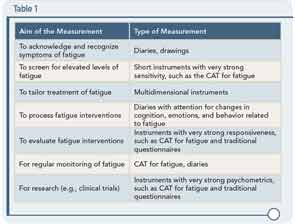For example, Dr. Bode said that if a rheumatologist wants insight into the pattern of fatigue, a fatigue diary can be used. If the aim is to screen for elevated levels of fatigue, a brief instrument with strong sensitivity should be used. Other suggested instruments based on aims are shown in Table 1.
Overall, she emphasized the importance of regular monitoring of fatigue to provide options for how to improve symptoms of fatigue.
Nonpharmacological Interventions
Sarah Hewlett, PhD, professor of rheumatology nursing at the University of the West of England, described the current evidence from randomized clinical trials on the nonpharmacological treatment of fatigue in RA. Among the interventions examined that have shown efficacy in managing fatigue are physical activity (e.g., low-impact aerobic exercise, pool therapy, Tai Chi, resistance training) as well as psychosocial interventions (e.g., self-efficacy and/or goal setting, cognitive behavioral therapy).
However, she emphasized that most of these studies were limited by not addressing fatigue as the primary outcome of the study. She emphasized that future studies on fatigue need to better address what should be measured, what works in whom, long-term efficacy, as well as specific details of physical activity (e.g., timing, intensity, progression, tailoring motivators, maintenance) and psychosocial interventions (e.g., delivery by usual clinical teams).
Mary Beth Nierengarten is a freelance medical journalist based in St. Paul, Minn.



